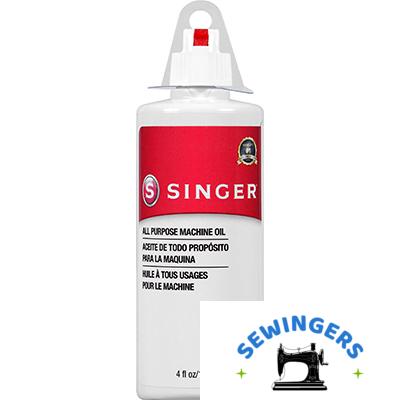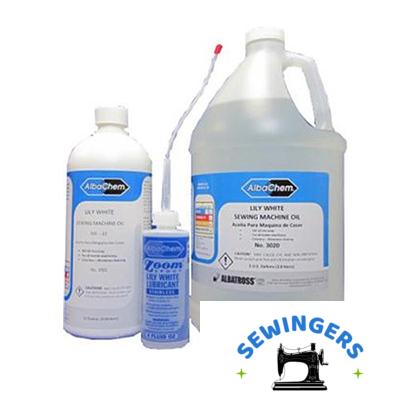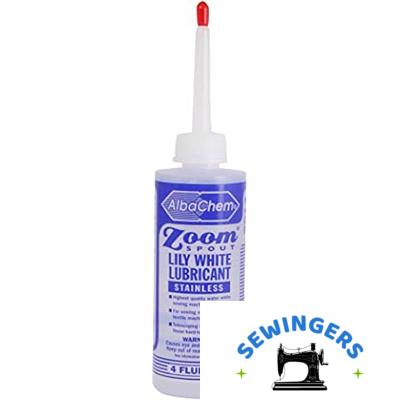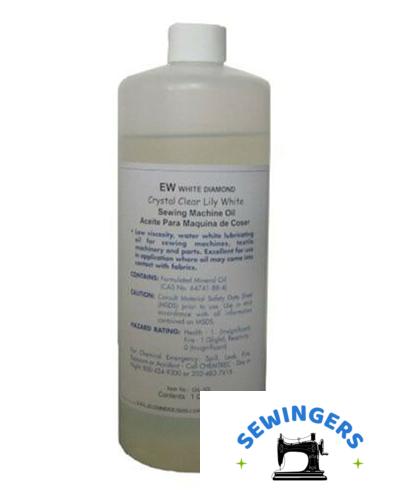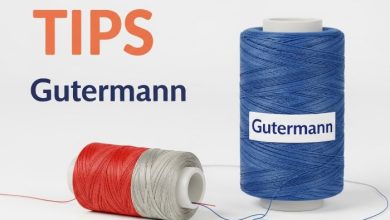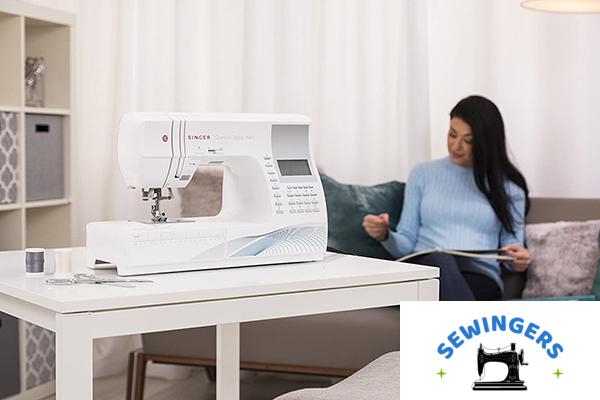Best Sewing Machine Oil For A Tranquil Tailoring

In the realm of sewing, the selection of appropriate tools and accessories can profoundly impact the performance and lifespan of your sewing machine. Among these essentials, sewing machine oil stands out as a vital yet often overlooked component of your sewing toolkit. In this discussion, I’ll unveil my top recommendation for sewing machine oil and elucidate its crucial role in preserving the health and efficiency of your sewing machine.
Without further ado, my foremost choice for sewing machine oil is the Singer 2131E All Purpose Oil. This particular oil shines brightly in safeguarding your sewing machine against corrosion and ensuring its durability. Surprisingly, even a mere drop of this oil can yield remarkable benefits.
But why exactly is sewing machine oil so indispensable? Well, it serves as an economical yet indispensable solution for maintaining the seamless operation of your sewing machine, irrespective of its age. The ideal sewing machine oil should boast several key attributes: superior lubrication to minimize friction, low viscosity for effortless flow, non-staining properties to preserve fabric integrity, odorlessness for user comfort, colorlessness to prevent undesirable marks, and resistance to staining to avert any residual buildup.
Within this discourse, I’ve meticulously curated a selection of cost-effective and pure oils that fulfill these criteria, offering impartial recommendations to aid you in selecting the optimal option for your sewing requirements. Indeed, the choice of sewing machine oil may seem trivial, but it plays a pivotal role in ensuring the enduring functionality of your sewing machine. Therefore, let’s delve into the realm of sewing machine oils and discern which one aligns best with your needs
Contents
- 1 Introduction
- 2 The Significance of Sewing Machine Oil
- 3 Key Factors to Keep in Mind When Selecting the Ideal Sewing Machine Oil
- 4 Different Types of Machine Oil and Their Advantages
- 5 Key Factors to Consider While Choosing A Sewing Machine Oil
- 5.1 Longevity
- 5.2 Safety First
- 5.3 The Art of Precision
- 5.4 The Valuable Properties of Oil
- 5.5 The Art of Viscosity
- 5.6 Clarity, Colorlessness, and Odorlessness
- 5.7 The Myth of Branded Oils
- 5.8 1. Singer 2131E All Purpose Machine Oil
- 5.9 2. Lily White Sewing Machine Oil
- 5.10 3. Zoom Spout Sewing Machine Oiler
- 5.11 4. Zoom-SPOUT Sewing Machine Oil Oiler
- 5.12 5. 1 Quart Lily White Industrial Sewing Machine Oil
- 5.13
- 5.14
- 6 How to Achieve Peak Performance with Your Sewing Machine through Proper Oil Application
- 7 Mastering Sewing Machine Maintenance for Professional Results
- 8 Closing Remarks
- 9 Frequently Asked Questions (FAQs)
Introduction
Sewing machines, those intricate marvels of craftsmanship, demand meticulous care to maintain their peak performance. Within the realm of sewing machine maintenance, a pivotal element lies in the selection and application of top-tier sewing machine oil. This specialized lubricant serves as the lifeblood of these machines, bestowing them with the gift of smooth and unhindered operation. It is the guardian against friction’s ravages, the shield against the corrosive touch of rust, and the secret to an extended lifespan. By judiciously choosing the finest sewing machine oil tailored to your specific needs, you unlock a realm of serene tailoring experiences, characterized by seamless stitches and a dearth of disruptions.
The Significance of Sewing Machine Oil
Sewing machine oil takes on a role of paramount importance in ensuring the harmonious operation of your sewing machine. It is the unsung hero that, with every drop, conjures a protective cocoon around the machine’s moving components, imbuing them with the gift of effortless motion. In doing so, it performs a delicate ballet of friction reduction, sparing the machine from the harsh embrace of heat generated during the sewing process. This transformative act not only elevates the machine’s performance but also extends its lifespan by curbing the insidious effects of wear and tear.
Furthermore, sewing machine oil stands as a stalwart guardian against rust, an ever-encroaching menace that seeks to undermine the durability of your prized equipment. Through regular and meticulous oiling, you undertake a sacred duty to preserve the efficiency of your sewing machine, warding off the specter of costly repairs that would otherwise haunt the future. In essence, the choice to embrace sewing machine oil as a faithful companion in your sewing journey is not merely prudent; it is an essential act of reverence for the art of tailoring and the machinery that breathes life into your creations.
Key Factors to Keep in Mind When Selecting the Ideal Sewing Machine Oil
When embarking on the quest for the perfect sewing machine oil to enhance your sewing experience, there are several critical factors to weigh carefully:
Viscosity:
Viscosity, essentially the oil’s thickness, plays a pivotal role in maintaining the seamless operation of your sewing machine. Opting for an oil with the correct viscosity is paramount. Should you choose oil that’s too thick, you risk slowing down your machine’s performance, while overly thin oil may fail to provide the necessary lubrication. To guarantee optimal results, it’s advisable to stick to sewing machine oils meticulously crafted for this purpose, ensuring they possess the ideal viscosity.
Compatibility:
One must exercise caution and diligence in determining whether the chosen oil aligns with the unique requirements of their specific sewing machine model. Different machines often necessitate distinct oils, and the use of an incompatible oil might inflict harm upon the internal components of your machine. To circumvent this issue, consulting the manufacturer’s recommendations or perusing your sewing machine’s manual for guidance on the suitable oil is highly recommended.
Quality:
Prioritizing high-quality sewing machine oils from esteemed brands should remain a top priority. These oils are meticulously tailored to meet the demands of sewing machines and endure stringent testing to ensure impeccable performance. The added assurance of using high-quality oils lies in their ability to prevent residue buildup or fabric staining, fostering a serene sewing environment.
Application Method:
An often-overlooked but invaluable consideration is the method of oil application. Certain oils are thoughtfully equipped with precision applicators, simplifying the process of reaching tight and intricate spaces, allowing for precise application where it’s needed most. This feature proves particularly advantageous for intricate sewing projects that demand the utmost precision.
In conclusion, the choice of sewing machine oil is not a trivial matter; rather, it’s a decision that can significantly impact the performance and longevity of your sewing machine. By carefully assessing viscosity, compatibility, quality, and application method, you can ensure a smoother and more enjoyable sewing experience, with your machine operating at its peak potential.
Different Types of Machine Oil and Their Advantages
Machine oils come in various categories, each with its unique properties and advantages. These oils are essential for maintaining the performance and longevity of your machines. Let’s delve into the three main types of machine oils: synthetic oil, petroleum-based oil, and natural oil.
-
Synthetic Oils
Synthetic oils represent a blend of mineral and petroleum oils, offering a premium lubrication solution for machines. While they may come with a higher price tag, their benefits make them a top choice for heavy-duty equipment. Here’s why:
Synthetic oils provide consistent and reliable performance, ensuring that your machines run smoothly and efficiently. They excel at lubricating both metal and plastic components, preventing thread breakage, and even polishing plastic surfaces to protect against degradation. Remarkably, even if you accidentally apply excessive oil, it won’t harm your machine. The quality and performance enhancement justify the investment in synthetic oil, making it a cost-effective choice in the long run.
-
Petroleum Oils or Mineral Oils
Petroleum-based oils, also known as mineral oils, offer a budget-friendly alternative for machine lubrication. They come with numerous advantages but require careful usage to avoid potential machine damage. Here’s what you need to know:
Petroleum oils are odorless and colorless, making them ideal for long-term machine use without any unpleasant side effects. They are safe for use around children and do not contain harmful chemicals, making them perfect for lubricating your machines and preventing any staining on fabrics or materials. However, it’s crucial to follow proper application guidelines to prevent any negative outcomes.
-
Natural Oils
Natural oils, often derived from ester oils, jojoba oils, and silicone, provide an eco-friendly alternative for machine lubrication. While they have their merits, there are some considerations to keep in mind:
Natural oils are not the top choice for oiling machines, as they may not deliver the same level of performance as mineral or synthetic oils. Their effectiveness may vary, and if not blended properly, they can cause the machine to stick and lead to quality deterioration. While they are environmentally friendly, it’s important to assess their suitability for your specific machine and application.
In summary, the choice of machine oil depends on your specific needs and preferences. Synthetic oils offer unparalleled performance and consistency, petroleum-based oils provide affordability and safety, and natural oils offer an eco-friendly option with certain limitations. Consider your machine’s requirements and application when selecting the right type of oil to ensure optimal performance and longevity.
Key Factors to Consider While Choosing A Sewing Machine Oil
In the vast world of sewing, where creativity knows no bounds, it’s easy to overlook the seemingly inconspicuous element that plays a pivotal role in the performance and longevity of your trusty sewing machine – sewing machine oil. In the grand tapestry of sewing, this humble lubricant quietly but decisively weaves the threads of precision and smooth operation.
In our quest for sewing excellence, we often dedicate extensive research to selecting the perfect fabric, the ideal needle, or the most exquisite thread. Yet, the role of sewing machine oil often goes underestimated, lurking in the background, ready to make or break our crafting endeavors.
It is said that even the smallest details matter, and this holds true when it comes to sewing. Whether you’re a seasoned seamstress or a novice enthusiast, delving into the nuances of sewing machine oil selection can save you from the unforeseen disruptions that may arise during your creative process.
In essence, researching a product, no matter how seemingly insignificant, is a practice rooted in wisdom. It empowers you with the knowledge necessary to make informed decisions and elevates your sewing prowess. After all, as the old adage goes, knowledge never goes out of style, and it certainly holds true in the realm of sewing.
So, let’s embark on a journey to uncover the key factors that should sway your choice when it comes to sewing machine oil, for it is these small choices that thread the needle of success in the world of sewing.
Longevity
In the world of machinery, wear and tear are inevitable companions, sparing no machine from their grasp. Yet, it would be unjust to lay blame solely on the shoulders of the manufacturers or brands. Instead, we hold the power to take proactive measures in preserving the life and functionality of our cherished devices. Indeed, for every problem, there exists a solution.
Consider the analogy of a well-oiled clockwork, which, when properly maintained, can endure the test of time, remaining as intricate and precise as the day it was crafted. Similarly, a sewing machine, with its myriad of moving parts, can remain in pristine condition, even spanning a century, if tended to with the right care. However, the key lies not just in applying any lubricant but in choosing one purposefully designed for this noble task. Attempting to substitute cooking oils, for instance, may inadvertently introduce operational woes.
Safety First
Just as one wouldn’t employ a sewing machine for laundering clothes, it is imperative to understand that not all oils are created equal when it comes to lubricating the intricate components and mechanisms of these devices.
Peruse the “Types of Oil” section to acquaint yourself with the appropriate lubricants tailored to your specific machinery. The judicious use of the right oil can serve as a safeguard, shielding metal parts from the corrosive embrace of rust and bestowing upon your device an extended lease on life.
The Art of Precision
Properly administering oil to your sewing machine begets the symphony of motion that is crucial for seamless and continuous operation over extended hours. However, it is paramount to grasp the nuances of the oil’s properties, for excessive lubrication can prove detrimental. Beware of adulterated oils with subpar lubricating qualities, emphasizing the importance of selecting the right oil for the task at hand.
To ascertain the optimal frequency of oiling during prolonged use, the attached manual can offer invaluable guidance.
The Valuable Properties of Oil
Oil, an unassuming and economical companion to your precious sewing machine, possesses the potential to elevate your craft to new heights. By acquiring knowledge of what to procure and how to discern its quality, you equip yourself to produce the finest garments. Investing a few dollars in the right machine oil today can save you countless dollars in the long run, as well as prevent frustration and downtime.
Genuine machine oil should be devoid of scent, color, and possess a density akin to water, ensuring it remains free-flowing. Should any of these characteristics be absent, exercise caution and abstain from using such a product. Always peruse the user manual diligently, as manufacturers frequently prescribe recommended oils for their machines.
The Art of Viscosity
Viscosity, in its simplest form, refers to the thickness of a liquid. Water, for instance, exhibits low viscosity, effortlessly spreading, while oil, with its higher viscosity, flows more deliberately. Excessive friction can usher in the specter of rust, yet employing a low-viscosity oil can serve as a shield against corrosion and abrasion. Regular application of the appropriate oil can bestow upon your machine the gift of effortless, swift, and efficient performance.
Additionally, it is prudent to heed the manufacturer’s counsel when it comes to selecting the right oil for your sewing machine. Typically, machine oil designed for sewing machines maintains a low viscosity, facilitating rapid dispersion.
Clarity, Colorlessness, and Odorlessness
Following the application of oil, your sewing machine will come into close contact with fabrics of various costs and qualities. Consequently, one cannot afford to gamble with staining these precious materials. Therefore, it is paramount that the chosen oil is easy to wash out and devoid of staining properties.
Superior machine oils exude transparency and clarity. Should the oil you have on hand fail to meet these criteria, it is wise to refrain from using it, as it may inflict harm upon your machine and its delicate components.
In the realm of sewing, none aspire to garments imbued with an unpleasant scent. A quality oil should remain odorless, ensuring it imparts no undesirable fragrance to your creations.
The Myth of Branded Oils
Contrary to popular belief, there exists no mandate stipulating the use of a brand-specific oil for your sewing machine. The notion of Singer oil for Singer sewing machines or Brother oil for Brother sewing machines is but a baseless myth.
Resist succumbing to such marketing ploys. A high-quality oil from a different brand, available at a more modest price point, can yield equally stellar results. Your primary consideration should always revolve around selecting a formulated oil tailored to your specific machine type, such as domestic oil for domestic sewing machines. In doing so, you exercise prudence and ensure the longevity and optimal performance of your cherished device
5 Top-Rated Sewing Machine Oil With Reviews
1. Singer 2131E All Purpose Machine Oil
Singer’s All-Purpose Machine Oil stands out as a top-tier choice among the array of oils available in today’s market. Its exceptional qualities extend far beyond the ordinary, making it a must-have for anyone looking to enhance the performance and longevity of their mechanical devices.
Contained within a sleek 4-ounce bottle, this meticulously formulated lubricant is designed to do more than just minimize resistance between metal components; it’s engineered to provide an unrivaled level of protection against corrosion, ensuring that your valuable machines remain in pristine condition for years to come.
By safeguarding the internal machinery against abrasion, rust, and the dreaded scourge of friction, this versatile oil becomes a steadfast ally in the maintenance of your devices. Whether you’re dealing with vacuum cleaners, knitting or sewing machines, computers, household appliances, bicycle gears, typewriters, or a myriad of other mechanical wonders, Singer’s All-Purpose Machine Oil proves itself as the ultimate solution.
If you’ve been on the hunt for a multi-functional oil that you can trust to deliver exceptional results, your search ends here. With Singer’s All-Purpose Machine Oil by your side, you can confidently rely on its unparalleled performance to keep your machines running smoothly and efficiently.
Pros
- Perfect choice for oiling metal parts that are in constant contact
- Provides protection against abrasion and manages to prevent needless wear and tear
- High quality, low viscous oil
- Inexpensive and gives much more than its cost
- Great lubrication for rattling fans, old machines. Just one or two drops and it works like a breeze
- Can be used for oiling moving parts, bearings, computers, fans, etc
Cons
- A user felt that the nozzle could be a little longer for hard-to-reach areas
- The spout sometimes become difficult to open.
2. Lily White Sewing Machine Oil
If you have any connection to the textile or clothing industry, you should definitely consider getting your hands on this exceptional oil without delay. There are numerous compelling reasons why this oil has become the preferred choice among devoted sewing enthusiasts.
With its crystal-clear water-white appearance, low viscosity, and pleasingly textured consistency, this oil stands out as the perfect choice for your sewing machines, clothing machinery, and their various components. Its unique attributes, such as non-gumming and low viscosity, have been deliberately engineered to ensure a hassle-free experience for the buyer.
You can confidently apply it wherever oil and fabrics might come into contact. This versatile oil can be effectively used in a wide range of applications, including knitting machines, quilting, embroidery, upholstery, and, not to be overlooked, sewing machines.
Pros
- A perfect oil bottle for novice seamstress
- Color is water white
- Clear lubricant that gives protection against oxidation and corrosion
- Low viscous
- All-purpose machine oil
- Not at all leave stains even when come in direct contact with any fabric or garment
- Reasonable priced, high quality machine oil
- Works great for industrial machines too.
Cons
- A buyer complained that about 2 pints of oil leaked during transportation. The seal should be tight and closed properly.
- You may need a small bottle or dropper to pour it right on to the target.
3. Zoom Spout Sewing Machine Oiler
Are you troubled by the thought of whether your valuable machine is getting the lubrication it truly deserves, especially in those hard-to-reach areas? Worry no more, for this remarkable lubricant possesses a unique ability to extend its influence precisely where it’s needed most, effortlessly infiltrating even the tiniest crevices within your beloved equipment.
Zoom has ingeniously formulated this transparent, petroleum-based lubricant to be the ultimate all-purpose solution. It not only showcases impressive qualities when it comes to preventing oxidation and rust, but it also distinguishes itself by its non-gumming feature. This means it won’t cling to fabrics or leave sticky residues between metal components.
The inclusion of a telescopic spout in this 4 oz lubricating oil is a game-changer for your machine’s durability. Upon application, it glides smoothly, much like a graceful bird in flight, delivering a performance that is nothing short of exceptional, a sight you’ve never witnessed before.
This 4 oz clear white sewing machine lubricant comes highly recommended for sewing machines, sergers, and an array of household appliances. A small bottle of this paraffin-based marvel is all you need to ensure your machine continues to operate smoothly and remains in immaculate condition.
Pros
- The spout is extra internal bendable
- Ideal for all-purpose use
- Stainless, telescopic spout to reach corners, tight and deep areas
- Easy to handle the oil flow
- Works well even at high temperatures
- Good for everyday maintenance
- Non gumming or sticking paraffin based oil avoids rusting and oxidation
- The spout is around 7 inches long and can be poured even in hard to reach areas
Cons
- The spout is too long and sometimes user faces difficulty in managing it
- It may spill if not used or kept carefully
4. Zoom-SPOUT Sewing Machine Oil Oiler
When it comes to ensuring the optimal performance and longevity of your machinery’s moving parts, look no further than Zoom Spout. This exceptional oiler is your ticket to machine excellence, right at your fingertips.
Zoom Spout boasts a non-detergent, highly refined mineral oil that is devoid of any harmful chemicals. It’s everything you could ever wish for and more. The beauty of this oil lies in its versatility – you can confidently apply it to those crucial areas where crafts and fabrics come into contact with your machinery and its intricate components.
Worried about potential stains on your precious fabrics? Fear not! Zoom Spout’s colorless properties won’t impede your tailoring endeavors. Should, by any chance, a mishap occur, it can be effortlessly removed, leaving your fabrics unblemished. Its pure and crystal-clear consistency makes it the top choice for textile sewing machines.
Whether you’re a seasoned fashion designer with an array of industrial machines or an enthusiast with a high-end domestic sewing machine, Zoom Spout’s low viscosity is a game-changer. It’s a boon for both machine types, promising to elevate their lifespan and performance to new heights.
In the world of machinery maintenance, Zoom Spout stands as the epitome of excellence, ensuring that your machines keep running smoothly and efficiently for years to come.
Pros
- Non detergent, refined mineral oil at nominal price
- Comes with perfect viscosity
- Best for both domestic and industrial machinery
- High purity and clarity
- Gives efficient and effective performance
- The bottle is refillable
- Comes in 4 oz or 118 ml
- It is a stainless white oil
- All purpose lubricant for sewing machines to its related equipment and tools
Cons
- The packing was of a thin bag and not packaged well
5. 1 Quart Lily White Industrial Sewing Machine Oil
Absolutely! Right before your very eyes, we proudly present the epitome of excellence: a premium, top-tier, and utterly transparent oil. It’s time to dispel any notions of simplicity and disguise – after all, we should never judge a book solely by its cover.
This immaculate, lily-white oil has been meticulously crafted with high-speed industrial sewing machines in mind. These machines, known for their lightning-fast performance, often subject their metal components to constant contact, leading to wear and tear, oxidation, and abrasion.
Enter the quart-sized lily oil, a solution not only tailored for the demands of industrial machinery but also perfectly suited for domestic sewing machines. Feel free to apply this remarkable oil wherever fabric and oiled components intersect. Trust us, you won’t be disappointed.
With its crystal-clear appearance, low viscosity, affordability, and versatile functionality, this mineral oil is poised to become your most trusted ally in servicing your machines.
Welcome this water-clear marvel into your arsenal, as it stands ready to fulfill its duty with unrivaled excellence.
Pros
- An excellent formulated mineral oil
- Premium lily white machine oiler
- 1 quart in an order and made in USA
- High refined lubricant to maintain the speed of your industrial sewing machines
- Works well for home sewing machine as well
- Water white tinge, low viscous oil for textile machinery and its parts, sewing machines etc
- Affordable, multi-functional and easy-to-use
Cons
- Some people confuse it with duplicate oilers as it comes with a homemade label on the jar.
- A buyer felt that it sometimes become messy while applying.
How to Achieve Peak Performance with Your Sewing Machine through Proper Oil Application
For those who take their sewing seriously, understanding the art of sewing machine maintenance is crucial for optimal results. The key to a smooth and efficient sewing machine lies in the proper application of sewing machine oil. Let’s dive into a comprehensive guide to ensure your sewing machine is well-oiled and ready to deliver exceptional results.
- Consult Your Sewing Machine’s Manual: Begin your journey towards sewing machine mastery by consulting your machine’s manual. This indispensable resource will reveal the specific areas in need of lubrication.
- Thoroughly Clean Your Machine: Before applying oil, give your machine a thorough cleaning. Remove any accumulated lint or debris that may hinder its performance. A clean machine is a responsive machine.
- Precise Oil Application: With your machine primed and ready, apply a small amount of sewing machine oil to the recommended parts. Focus on crucial areas such as the bobbin case, needle bar, and hook race. These are the lifeblood of your machine’s mechanics.
- Even Distribution: Ensure an even distribution of oil by using a lint-free cloth or a cotton swab. Wipe away any excess oil, leaving just enough to keep your machine well-lubricated.
- Warm-Up Your Machine: To allow the oil to permeate and optimize the internal components, run your machine at a slow speed for a few minutes. This warming-up process ensures the oil reaches every nook and cranny.
- Exterior Clean-Up: To avoid unsightly stains on your fabrics, make sure to wipe off any residual oil from the machine’s exterior. This simple step ensures that your sewing projects remain pristine.
Remember, consistent maintenance is the key to longevity and peak performance. Follow your manufacturer’s guidelines for regular oiling to keep your sewing machine humming along smoothly.
Mastering Sewing Machine Maintenance for Professional Results
Beyond the realm of sewing machine oil, there are additional steps you can take to maintain your sewing machine’s pristine condition. Here are some valuable tips to elevate your sewing experience:
- Post-Use Clean-Up: After every sewing session, make it a habit to clean your machine. Removing lint and debris promptly prevents any build-up that could lead to performance issues.
- Needle Care: Change your needles regularly to avoid thread breakage and ensure smooth stitching. A fresh needle can make all the difference in your sewing endeavors.
- Protective Measures: When your machine is not in use, keep it covered to shield it from dust and moisture. This small precaution can extend the life of your beloved sewing companion.
- Gentle Sewing: Avoid putting excessive force on your machine while sewing. Gentle handling preserves the motor’s longevity and ensures consistent results.
- Professional Servicing: Don’t neglect the importance of professional servicing. Schedule regular maintenance checks with a sewing machine expert to catch and address any potential issues, keeping your machine in prime condition.
By adhering to these maintenance tips and applying high-quality sewing machine oil, you’ll embark on a journey of tranquil tailoring experiences and consistently achieve professional-grade results in your sewing projects. Your sewing machine will become not just a tool but a trusted partner in your creative endeavors.
Closing Remarks
In this extensive piece, we’ve carefully examined a range of lubricants, each with its own distinct advantages. These products have been subjected to thorough research, rigorous analysis, and exhaustive evaluation to offer you the optimal choices for maintaining your sewing machine.
Among the exceptional options discussed, the Singer 2131E All Purpose Oil emerges as the top choice. This outstanding lubricant embodies the essential qualities of an ideal machine oil, featuring low viscosity, clear color, absence of odor, and robust protection against wear and tear.
It’s crucial to emphasize the importance of using oil specifically designed for sewing machines. Using the wrong type of oil can cause the machine to seize up and potentially damage its delicate moving parts. By following the manufacturer’s recommendations and heeding the advice of experienced users, regular lubrication becomes an indispensable practice for ensuring the longevity and optimal performance of your sewing machine.
In the quest to maintain your machine’s efficiency and lifespan, selecting the appropriate oil is paramount.
Frequently Asked Questions (FAQs)
Can I use any type of oil for my sewing machine?
No, it is essential to use oil specifically designed for sewing machines. Regular household oils may not have the correct viscosity or may contain impurities that can damage the internal components of your machine.
How often should I oil my sewing machine?
The frequency of oiling depends on the usage and the recommendations provided by the manufacturer. As a general guideline, it is recommended to oil your sewing machine after every 8 to 10 hours of use or at least once a month.
Can I use sewing machine oil for other purposes?
It is best to use sewing machine oil solely for lubricating sewing machines. Different types of machinery may require specific oils formulated for their needs.
Is it necessary to clean my sewing machine before applying oil?
Yes, it is crucial to clean your sewing machine before applying oil. Removing lint, dust, and debris ensures that the oil can penetrate the necessary parts effectively and reduces the risk of clogs or malfunctions.
Can sewing machine oil remove rust from my machine?
While sewing machine oil can help prevent rust formation, it may not be sufficient to remove existing rust. If you notice rust on your machine, it is recommended to consult a professional for appropriate rust removal techniques.



